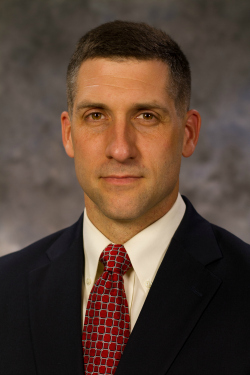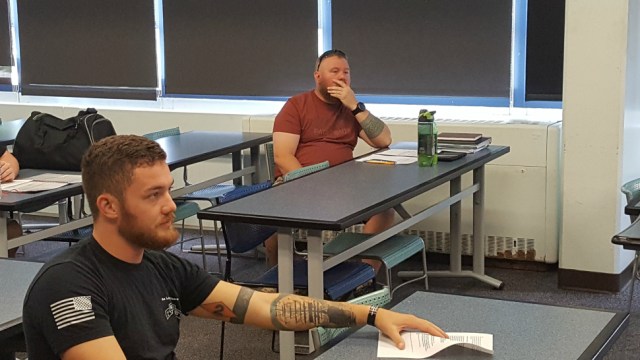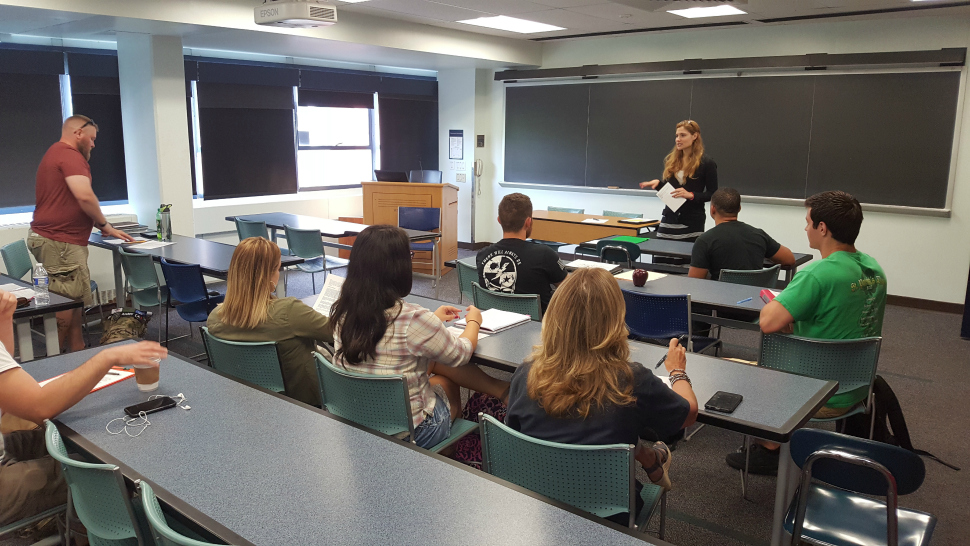John Tolley, September 8, 2016
Veterans are prepared for many things during their military training from managing combat scenarios to life-saving battlefield medicine to operating advanced technology. But they are often less prepared for the transition from military to college life. While the new, post-9/11 GI Bill provides 36 months of free tuition for any veteran who serves at least three years, it does not provide guidance on moving from a military culture to an academic one.
For Penn State?s Erik Orient, this is a familiar feeling. Not only did Orient serve 22 years in the US Marine Corp – completing both his undergraduate and graduate degrees while still on active duty - but he currently serves as director of the Penn State Engineering Ambassadors program.
This semester, Orient is combining his intimate knowledge of both worlds in a brand new course aimed at veterans in their first years of college. ?Transition is the Mission? is set to tackle the variety of topics covered by regular first-year university seminars, but with an emphasis on what makes the veteran experience so unique.
BTN LiveBIG recently got a chance to speak with Mr. Orient about the creation of the course and what his hopes are for the inaugural first semester.
BTN LiveBIG: Can you tell us a bit more about some of the problems veterans face when making the leap from the military to college?
 Erik Orient: The full transition isn?t just getting to college; it?s ensuring you do that right so that you get a degree that has a payoff at the back end. I tell veterans to ask themselves, ?Where do I want to be post college?? Then you pick the degree that gets you there.
Erik Orient: The full transition isn?t just getting to college; it?s ensuring you do that right so that you get a degree that has a payoff at the back end. I tell veterans to ask themselves, ?Where do I want to be post college?? Then you pick the degree that gets you there.
[Many veterans] come to college without the full understanding of what they?re getting into, what different degrees are, and what careers they lead to. By the time they figure it all out, it?s their junior year. And, you can only change your major so many times before you start delaying your time to graduation and then what happens is you run out of your VA education benefits.
BTN LiveBIG: What measures do you think need to be taken to help ease this transition?
Orient: Outreach needs to happen immediately when they set foot on campus. That is when they need to start thinking about where they want to go.
When I had my first class, there was a young Marine there and I asked, ?Why are you here, buddy?? He said, ?Well, I got out of the Marines and I didn?t know what to do but I got this GI Bill benefit, so I?m here.? I said, ?Man, you are the reason that we?re having this class. Let?s help you get on track.?
BTN LiveBIG: And how did the ?Transition is the Mission? course come about?
Orient: A good friend of mine who works in the Office of Veterans Programs at Penn State told me that he thought something like this was necessary. I know that Penn State values its students and it values its student veterans, so I just kept shaking the tree until I found the right dean who would say, ?We will host that class.? It was the college of education who agreed to host the class as a pilot offering. They already have an existing first-year seminar, so they said they?d let one section be veterans-specific and open to all student veterans, not just education majors.
BTN LiveBIG: What do you plan on covering throughout the course?
Orient: One component is maximizing your college experience. There is a 2010 study by the National Survey for Student Engagement that found that veterans go to class, they study hard and log a lot of academic hours, but they do not participate in extra-curricular activities at the same level as their civilian counterparts.
Another component is the career transition aspect. Veterans, from what I?ve seen, are not very skilled at networking, and I?d say that is because it can appear a little bit self-aggrandizing and that?s just not the service model. They also aren?t typically skilled at translating their military experience into transferable skills that employers value. Thus, many veterans? resumes are full of jargon and acronyms that do not make sense to those who are reading the resume.
[They are also] being exposed to all the resources on campus, whether that be housing services, psychological services, the libraries, mentoring, tutoring, anything that can assist people. As a returning adult student, there is sometimes a bit of insecurity around having been out of the classroom for a while.

BTN LiveBIG: Going forward, what are some outcomes you hope to see from the ?Transition? course? What are your long-term goals with a program like this?
Orient: The GI Bill is such a generous and tremendous program paid for by the American taxpayers. We should be good stewards of that money. We should be making sure that veterans, who are often times first-generation college students, are put on the right path to success. I don?t like any press or media that indicates the veteran community is broken. It?s not. It?s very strong and anything that can be done to showcase the very best of student veterans is what I want to do and what I want to be part of.







